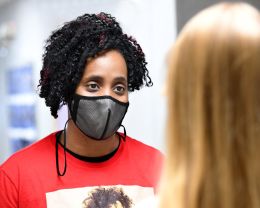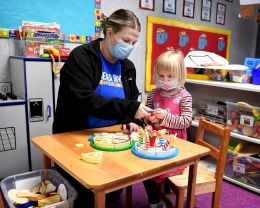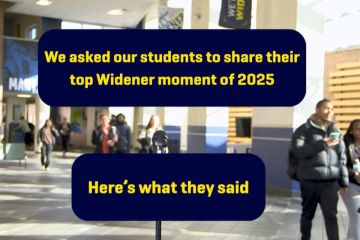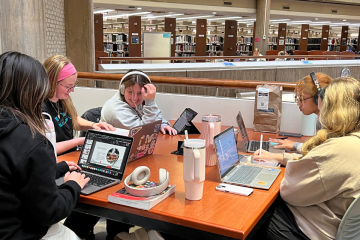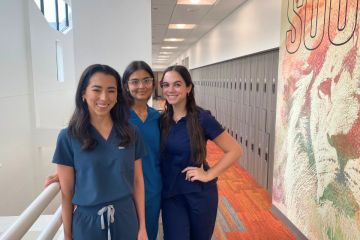Child Development Center's Innovative Student-Learning Approach Bolsters Child Care

If it takes a village to raise a child, then Dr. Essence Allen-Presley has assembled a bustling city of professionals-in-training to provide vital childcare and Pre-K services under her direction at the Widener Child Development Center (CDC). And their work goes far beyond teaching.
From undergraduate nurses and engineers to graduate physical therapy and social work clinicians, a unique cast of Widener students has found the CDC to be a real-life learning laboratory where they can gain valuable hands-on field experience that prepares them for their careers. They contribute to a loving, nurturing center that provides child care to children ages 3-5 who come from diverse backgrounds. Some have a parent who works for the university, others have no connection to Widener.
This holistic approach to staffing an early childhood center isn’t something that Allen-Presley set out to innovate at the CDC, but regardless the model is making waves: In late 2021, the center was the main recipient of a $175,000 grant through the Pennsylvania Pre-K Counts program. The program works to expand the number of children able to experience a high-quality pre-kindergarten program, and Widener’s selection solidified the CDC’s reputation for excellence. The grant is allowing the CDC to add placements for an additional 16 children.
“At first, I just needed to fill staffing shortages. I didn’t know I was building a model,” Allen-Presley recalled of her decision to recruit Widener undergraduate and graduate students to the CDC staff. “In K-12 education, staff like school counselors are invaluable, but you don’t typically see that at the early childhood level, and I can’t do everything!”
In determining where she most needed staff assistance, Allen-Presley began to consider the range of majors and other education programs the university offered, and what disciplines intersected best with the supports she needed at the CDC. Children come to the CDC with a diverse range of abilities, and she knew many could benefit from extra services.
Utilizing the university resources, students, and everything else Widener has to offer allows us to extend our well-oiled machine to the community at an affordable rate. The Widener students get the experience they need to supplement what they’re doing in the classroom, and I get their valuable support to manage everything from family engagement and classroom management and a lot more." —Essence Allen-Presley, director of The Child Development Center
For Ethan Einhorn, a speech-language pathology student who served as a graduate clinician at the CDC in the fall, the experience taught him how to take skills from his coursework and apply them in the moment. He learned to adapt quickly and has developed “dos and don’ts” of working with kids. For example, when he’s going to start an activity designed to improve a child’s communication skills, he’s found gently telling them what they’ll be doing works better than asking if they want to begin. It’s a subtle difference that gets them off to a positive start.
“You wouldn’t read that in a textbook necessarily but it’s so valuable to understand how to work with a child one-on-one and administer the speech-language services they need to communicate to the best of their ability. That’s what I want to do with my career,” he said.
Einhorn explained that the goals of speech-language pathology for Pre-K students focus on developing skills like turn-taking and comprehending and responding to questions. Those are competencies, Allen-Presley says, that people may think children learn in kindergarten but actually are learned earlier. The time before kindergarten is crucial for children to establish those skills, and for teachers, caregivers, and specialists to intervene with children who need extra help.
“Parents may not even be aware of how to cultivate those abilities in their child or they might not realize what intervention in a field like speech-language pathology or occupational therapy even looks like, so to be able to provide those extra supports can make such a difference,” she said.
Hands-on Advocacy
Though JoAnn Clark, an occupational therapy doctoral candidate, spent only six weeks at the CDC for a summer field work placement, her experience providing that extra
support in the classroom reframed her future career path completely.
“My work at the CDC was aimed at increasing classroom participation and helping integrate all students into activities to the best of their abilities,” Clark said. “Taking what I learned from my classes and really being able to implement behavior strategies for a variety of students with different abilities was tough but incredibly rewarding.”
Helping Pre-K children regulate their social and emotional behaviors is a big task, Clark said, but whether she was calming a child on the playground or providing strategies for a student to be able to sit still for five minutes, she learned through action just how vital her work was.
I got into occupational therapy to be an advocate for historically-excluded groups in society and people of different abilities, and after working at the CDC, I’ve learned so much about how to stand up for students’ wants and needs.” —JoAnn Clark, an occupational therapy student
“I actually asked my field work supervisor for another school placement after my time at the CDC. The experience showed me I definitely want to work in a school setting.”
The Joy of the Job
For education majors and for clinicians like Einhorn and Clark, the CDC provides an unparalleled opportunity to apply their knowledge and skills in a setting they might work in one day, but for other Widener students at the CDC, the joy of the job is in the release from their classroom studies.
Jo’Elle Evans, a junior biomedical engineering student, and Lauren Ludwig, a sophomore nursing major, both held work-study jobs at the CDC last semester as classroom aides. While Ludwig says some people found her job unusual for her major, with a career goal of being a pediatric nurse practitioner, she knew the CDC was exactly where she wanted to be.
Working at the CDC completely solidified my goals for my future life after graduation. I witnessed so much growth in the children in only a few short months but the best thing was fostering unique relationships with each student as they learned their alphabet, numbers, and days of the week.” —Lauren Ludwig, a nursing student
“Creating positive relationships with my future patients and their families is something I will constantly be needing to do in my work. Here, I learned just how far patience, love, and a positive attitude can affect the life of a child,” she said.
For Evans, her time at the CDC away from intensive math and science courses brings much-needed laughs and lightheartedness to her days.
“Being around the students really helps diffuse any anxiety and tension I have. Despite having some tough moments with the kids, every time I go to work at the CDC, I just feel so happy to be there,” she said.
“I like being able to give back to the community too because these children are our future, and they deserve all the care and support we can give them.”
“That care,” Allen-Presley says, “is what makes all the difference.”
“The community of Chester has been designated as underserved for a very long time and now with this Pre-K Counts grant and hopefully another grant, the CDC will really be a model of what excellent education looks like right here in this zip code,” she said.
Einhorn, Clark, and Ludwig will all be moving onto different fieldwork placements this spring, but Evans will return to her work-study job at the CDC this semester. She cites the creativity and silliness of the kids along with the generosity and passion of Allen-Presley for making the decision to continue this job the easiest ‘yes’ of her working life.
Evans will surely be encountering new clinicians, student teachers, and therapists-in-training as more Widener students with diverse backgrounds, interests, and skills bring their gifts to the CDC. That unique tapestry of talents seems poised to only grow the community care the CDC offers each child, teacher, staff member, student worker, graduate clinician, and family member in its universe.

